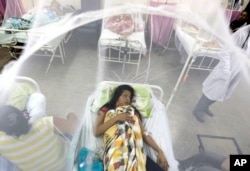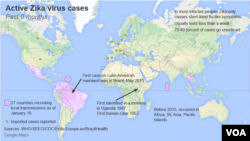The International Federation of Red Cross and Red Crescent Societies is appealing for $2.3 million in emergency funds to help communities control the mosquito that is spreading the Zika virus in nearly 30 countries in the Americas
The IFRC said it is taking action in response to the alarming spread of the Zika virus throughout the Americas. Brazil has recorded more than 4,000 cases of microcephaly, a disease that causes brain damage in newborns. The World Health Organization has declared Zika a global health emergency because of its suspected link to this disease.
The Red Cross is mobilizing its large volunteer force in affected communities to help them clear up the trash and areas where the mosquitoes can breed, so eggs laid do not hatch months later, and to make sure communities sustain these activities to ensure long-lasting disease control.
Mosquito eradication
The IFRC’s director of health, Julie Lyn Hall, said the Aedes Aegypti mosquito, which spreads the virus, also transmits dengue, which kills more than 25,000 people a year. She notes children drink the dirty water in which mosquitoes breed. This, she said, can lead to diarrhea, which kills about 800,000 children under 5 every year.
“So, the clear up, the clean-up, and the keep-it-up is extremely important for Zika, but it will also help with dengue and diarrheal illness,” she said.
Hall said people living in slums in urban areas are most at risk; but, she warns against communities in less affected areas from becoming complacent.
She told VOA the mosquitoes can fly up to 200 meters by themselves from where they hatch; but notes they also love to hitch a ride.
“So they are perfectly capable of getting a lift on a plane, on a boat, inside tires, inside bamboo that is moved around the world,” said Hall. “And, of course, we live in an extremely globalized world now with a lot of trade and travel of people around the world.”
Health officials say it will take years for a vaccine against Zika to be developed. In the meantime, they say the best measures people can take against the virus are vector control, along with prevention and personal protection.






